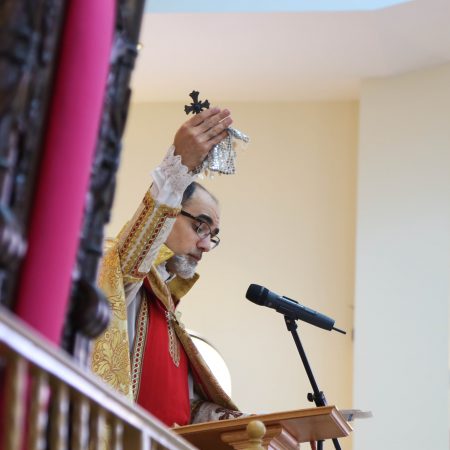“We have been filled, with your good things, O Lord, by tasting of your Body and Blood. Glory in the highest to you who sustain us.”
My uncle Joe Sarkisian passed away last year, after a long life. He was the brother of my grandfather and my favorite great uncle. He taught us to play poker and always had funny jokes with words I wasn’t allowed to say, but he could. He was most famous among my cousins, however, for how he always said goodbye. Uncle Joe would pump your hand hard two times up and down, and then wave your hands in an S shape, tracing out a dollar sign to wish you prosperity on your way. This ritual was known as the money handshake, and we would all line up to make sure we didn’t miss out on it. Our church also has a ritual with money, the weekly collection. We don’t think of this ritual as a powerful or important part of our worship, but it is. I realized the power of the collection plate in something that happened when I was a teenager at St. James Armenian Church in Watertown. Every Sunday from time immemorial, the collection plate would be passed after Holy Communion at the start of the hymn Ltsak. One Sunday, the alternate organist was playing. As always we took communion and passed the plate during Ltsak. After Der Dajad preached, however, instead of closing Badarak with the final hymn Yeghitsi, the organist mistakenly started in on Ltsak for a second time. Like magic, upon hearing those 4 notes (lts-ssah-ah-aah aaahkk) people again started to put their hands in their pockets to give! The collection is indeed a powerful church ritual. But is it important, is it significant in your faith life and that of the church?
Well if somebody asked you what the high point of your Sunday morning worship experience at St. Hagop was, you might say it’s the beautiful sacred music sung by our choir, or maybe you’d say receiving communion, or maybe you’d even say the high point of your worship is the wonderful sermons! But how many of you would say that the part you enjoyed most was the plate collection? Not many I’d say, and you might even have seen a few people who leave to avoid it. Nonetheless, passing the plate is an important part of our worship, historically and theologically.
In the early days of the Christian Church, back in the third century, the collection was often taken up right after the Gospel was read – before the sermon was preached. It was seen as the people’s response to the words of Jesus, the life of Jesus. So much so, that St. Cyprian once got so mad at his congregation, that he refused to allow a collection and people complained to the bishop. You see, by refusing their offerings, Cyprian was virtually excommunicating them. That’s how seriously early Christians took their collections.
So, we don’t take collections to raise money for the church. And we at St. Hagop didn’t make our transition into our pledge stewardship program to raise money for the church. First and foremost, we take the collection and make pledges so that you and I have a chance to offer something back to God for all the blessings he has offered in our own lives and in the life of this church.
This concept of mutual offering is crucial in understanding the heart and dynamic of our worship. The very name of our Sunday service is The Offering, Badarak, denoting first and foremost God’s offering of Himself as a gift for our abundant life. But as important is our offering in response, which is made tangible in the ritual of the collection plate. Not that our offerings to God are restricted to just money, or just the collection plate. But I must say that I have yet to see the person who gives generously of their prayers, time and care who doesn’t also give generously of their wealth (be that $50 for someone of little means or $50,000 for someone of great means). That’s because time and money are two sides of the same coin; all money is really, is a tangible expression and extension of our time and care.
So the ritual of the offering, of giving to the church in stewardship is something essential, traditional and very deep in our church. The power of the ‘money’ hymn Ltsak, that has us reaching for our pockets, is not just musical or psychological but goes to the heart of the mutual offering that is our Badarak. Listen again to the words of the hymn. “We have been filled, with your good things, O Lord, by tasting of your Body and Blood. Glory in the highest to you who sustain us.” In worship we see life for what it is, pure gift, where we are filled and fulfilled by all God’s good things. In response to such boundless generosity, how can we help but not respond in kind. How can we not see that whenever we come into the presence of the Lord, we depart with a money handshake, going on our way with unearned blessings and prosperity that we then can’t help but share, now and always; amen.


0 Comments